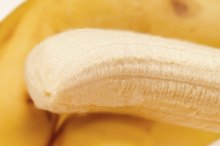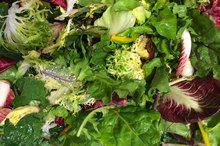What does fact checked mean?
At Healthfully, we strive to deliver objective content that is accurate and up-to-date. Our team periodically reviews articles in order to ensure content quality. The sources cited below consist of evidence from peer-reviewed journals, prominent medical organizations, academic associations, and government data.
The information contained on this site is for informational purposes only, and should not be used as a substitute for the advice of a professional health care provider. Please check with the appropriate physician regarding health questions and concerns. Although we strive to deliver accurate and up-to-date information, no guarantee to that effect is made.
Canned Mandarin Oranges & Potassium
Most people don't have to worry about getting enough of the mineral potassium, because deficiencies are almost unknown in the industrialized world. Healthy people generally don't have to worry about getting too much potassium, either. But high levels of potassium are a problem for those whose kidneys are so impaired, they can no longer regulate levels of this mineral. For these people, the potassium content of canned mandarin oranges could be problematic 1.
Potassium Content
The U.S. Department of Agriculture reports that one cup of canned mandarin oranges packed in juice has 331 mg of potassium 1. Draining the juice lowers the total potassium to 257 mg.
Guidelines
Juices Low in Potassium
Learn More
The National Kidney Foundation defines a high-potassium food as one with more than 200 mg of potassium per serving 2. According to this definition, a cup serving of mandarin oranges could qualify as a high-potassium food. If you have high levels of potassium, a better approach would be to eat this food only occasionally, perhaps tossing a few sections of mandarin orange with low-potassium fruits like apple.
Consequences
Potassium facilitates the transmission of electrical impulses among nerve cells. Most people don't have to worry about potassium, because their kidneys automatically make sure that levels are within healthy limits. But it is a concern for kidney patients whose potassium levels are high enough to affect their nervous systems, as high levels can cause irregular heartbeat. High levels of potassium are treated with low-potassium diets, which is why foods like canned mandarin oranges can be an issue for those with kidney disease 1.
- Potassium facilitates the transmission of electrical impulses among nerve cells.
- But it is a concern for kidney patients whose potassium levels are high enough to affect their nervous systems, as high levels can cause irregular heartbeat.
Warning
What Is the Potassium Content in a Banana?
Learn More
According to the National Kidney Foundation, one in nine Americans has some form of kidney problem 2. This means that potassium is a possible issue for a large number of people. If you have kidney disease, your nephrologist will monitor your potassium levels. Knowing your potassium numbers will help you decide whether high-potassium foods like canned mandarin oranges are an issue 1.
Related Articles
References
- Tangerines, (Mandarin Oranges), Canned, Juice Pack, Drained
- National Kidney Foundation: Potassium and Your CKD Diet
- MedlinePlus: Hyperkalemia
- Potassium. Office of Dietary Supplements. National Institutes of Health
- Lambert H, Frassetto L, Moore JB, et al. The effect of supplementation with alkaline potassium salts on bone metabolism: a meta-analysis. Osteoporos Int. 2015;26(4):1311-8. doi:+10.1007/s00198-014-3006-9
- Chatterjee R, Slentz C, Davenport CA, et al. Effects of potassium supplements on glucose metabolism in African Americans with prediabetes: a pilot trial. Am J Clin Nutr. 2017;106(6):1431-1438. doi:10.3945/ajcn.117.161570
- Potassium. Fact Sheet for Consumers. Office of Dietary Supplements. National Institutes of Health
- Health Claim Notification for Potassium Containing Foods. US Food and Drug Administration
- Aburto NJ, Hanson S, Gutierrez H, Hooper L, Elliott P, Cappuccio FP. Effect of increased potassium intake on cardiovascular risk factors and disease: systematic review and meta-analyses. BMJ 2013;346:f1378.
- Academy of Nutrition and Dietetics. What Is Potassium?
- ConsumerLab.com. Potassium Supplements Review.
- Curhan GC, Willett WC, Rimm EB, Stampfer MJ. A prospective study of dietary calcium and other nutrients and the risk of symptomatic kidney stones. N Engl J Med 1993;328:833-8.
- Curhan GC, Willett WC, Speizer FE, Spiegelman D, Stampfer MJ. Comparison of dietary calcium with supplemental calcium and other nutrients as factors affecting the risk for kidney stones in women. Ann Intern Med 1997;126:497-504.
- D’Elia L, Barba G, Cappuccio FP, Strazzullo P. Potassium intake, stroke, and cardiovascular disease a meta-analysis of prospective studies. J Am Coll Cardiol 2011;57:1210-9.
- O’Neil C, Keast D, Fulgoni V, and Nicklas T. Food sources of energy and nutrients among adults in the US: NHANES 2003-2006. Nutrients. 2012;4:2097-120. DOI: 10.3390/nu4122097.
- Stone M, Martyn L, and Weaver C. Potassium intake, bioavailability, hypertension, and glucose control. Nutrients. 2016;8: E444. DOI: 10.3390/nu8070444.
- U.S. Food and Drug Administration. Health Claim Notification for Potassium Containing Foods.
- Weaver CM. Potassium and health. Adv Nutr 2013;4:368S-77S.
- Yong Sun, et al. Dietary potassium regulates vascular calcification and arterial stiffness. JCI Insight. 2017;2(19):e94920.
Writer Bio
Shelly Morgan has been writing and editing for over 25 years for various medical and scientific publications. Although she began her professional career in pharmacological research, Morgan turned to patent law where she specialized in prosecuting patents for medical devices. She also writes about renal disease and hypertension for several nonprofits aimed at educating and supporting kidney patients.









